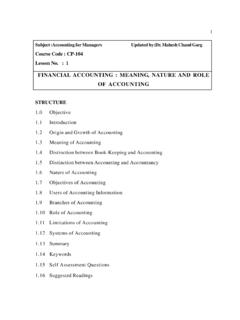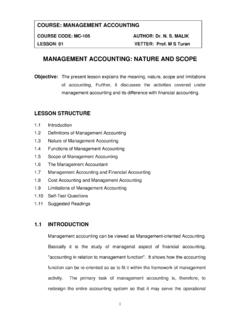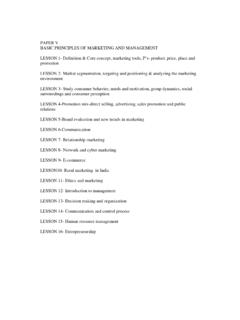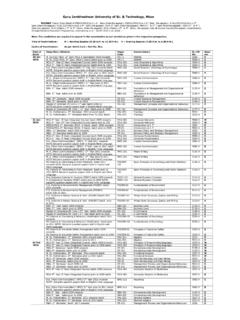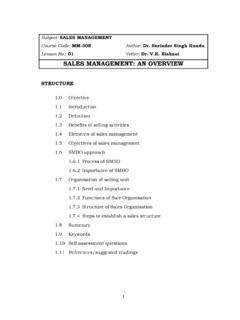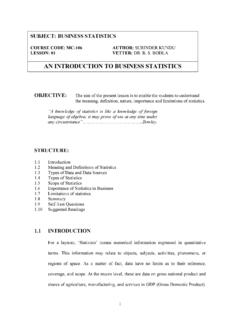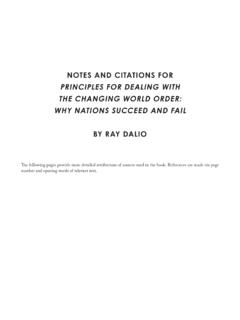Transcription of MULTINATIONAL FINANCIAL MANAGEMENT: AN …
1 Subject code: FM-406/IB-416 Author: Dr. Sanjay Tiwari Lesson: 1 Vetter: Dr. Bodla MULTINATIONAL FINANCIAL management : AN OVERVIEW STRUCTURE Objectives Introduction Nature and scope of international FINANCIAL management Evolution of MNCs Theory and practice of international FINANCIAL management Summary Keywords Self assessment questions References/Suggested readings OBJECTIVES After reading this lesson, you should be able to- Understand the factors responsible for emergence of globalized FINANCIAL markets. Understand meaning, nature and scope of international FINANCIAL management . Describe goals for international FINANCIAL management . INTRODUCTION FINANCIAL management is mainly concerned with how to optimally make various corporate FINANCIAL decisions, such as those pertaining to investment, capital structure, dividend policy, and working capital management , with a view to achieving a set of given corporate objectives.
2 2 In anglo-American countries as well as in many advanced countries with well-developed capital markets, maximizing shareholder wealth is generally considered the most important corporate objective. Why do we need to study international FINANCIAL management ? The answer to this question is straightforward: We are now living in a highly globalized and integrated world economy. American consumers, for example, routinely purchase oil imported from Saudi Arabia and Nigeria, TV sets and camcorders from Japan, Italy, and wine from France. Foreigners, in turn, purchase American-made aircraft, software, movies, jeans, wheat, and other products. Continued liberalization of international trade is certain to further internationalize consumption patterns around the world.
3 Recently, FINANCIAL markets have also become highly integrated. This development allows investors to diversify their investment portfolios internationally. In the words of a recent Wall Street Journal article, Over the past decade, US investors have poured buckets of money into overseas markets, in the form of international mutual funds. At the same time, Japanese investors are investing heavily in US and other foreign FINANCIAL markets in efforts to recycle their economous trade surpluses. In addition, many major corporations of the world, such as IBM, Daimler-Benz (now, Daimler Chrysler), and Sony, have their shares cross-listed on foreign stock exchanges, thereby rendering their shares internationally tradable and gaining access to foreign capital as well.
4 Consequently, Daimler-Benz s venture, say, in China can be financed partly by American investors who purchase Daimler-Benz shares traded on the New York Stock Exchange. During last few decades a rapid internationalization of business has occurred. With the increase in demand of goods and services due to opening of borders of countries around world, the requirement of capital, 3 machinery and technological know-how has reached to the topmost level. Now no single country can boast of self-sufficiency because in a global village a vast population of multidimensional tastes, preferences and demand exists. Undoubtedly, we are now living in a world where all the major economic functions- consumption, production, and investment are highly globalized.
5 It is thus essential for FINANCIAL managers to fully understand vital international dimensions of FINANCIAL management . In order to cater to needs/demand of huge world population, a country can engage itself in multi trading activities among various nations. In the post WTO regime (after 1999 onwards), it has became pertinent to note that MNCs ( MULTINATIONAL corporations) with their world-wide production and distribution activities have gained momentum. An understanding of international FINANCIAL management is quite important in the light of changes in international environment, innovative instruments and institutions to facilitate the international trading activities. Classical theory of trade assumes that countries differ enough from one another in terms of resources endowments and economic skills for these differences to be at the centre of any analysis of corporate competitiveness.
6 Now there is free mobility of funds, resources, knowledge and technology which has made international trade more dynamic and complex. Capital moves around the world in huge amount; corporations are free to access different markets for raising finance. There exists an international competitiveness in different areas of trade and commerce. The enormous opportunities of investments, savings, consumption and market accessibility have given rise to big institutions, FINANCIAL instruments and FINANCIAL markets. Now a days an investor in USA would like to take investment opportunity in offshore markets. The trade off between risk of investing in global markets and return from 4 these investments is focussed to achieve wealth maximisation of the stakeholders.
7 It is important to note that in international FINANCIAL management , stakeholders are spread all over the world. NATURE AND SCOPE OF INTERNATIONAL FINANCIAL management Like any finance function, international finance, the finance function of a MULTINATIONAL firm has two functions namely, treasury and control. The treasurer is responsible for FINANCIAL planning analysis, fund acquisition, investment financing, cash management , investment decision and risk management . On the other hand, controller deals with the functions related to external reporting, tax planning and management , management information system, FINANCIAL and management accounting , budget planning and control, and accounts receivables etc. For maximising the returns from investment and to minimise the cost of finance, the firms has to take portfolio decision based on analytical skills required for this purpose.
8 Since the firm has to raise funds from different FINANCIAL markets of the world, which needs to actively exploit market imperfections and the firm s superior forecasting ability to generate purely FINANCIAL gains. The complex nature of managing international finance is due to the fact that a wide variety of FINANCIAL instruments, products, funding options and investment vehicles are available for both reactive and proactive management of corporate finance. MULTINATIONAL finance is multidisciplinary in nature, while an understanding of economic theories and principles is necessary to estimate and model FINANCIAL decisions, FINANCIAL accounting and management accounting help in decision making in FINANCIAL management at MULTINATIONAL level.
9 5 Because of changing nature of environment at international level, the knowledge of latest changes in forex rates, volatility in capital market, interest rate fluctuations, macro level charges, micro level economic indicators, savings, consumption pattern, interest preference, investment behaviour of investors, export and import trends, competition, banking sector performance, inflationary trends, demand and supply conditions etc. is required by the practitioners of international FINANCIAL management . Distinguishing features of international finance International Finance is a distinct field of study and certain features set it apart from other fields. The important distinguishing features of international finance from domestic FINANCIAL management are discussed below: 1.
10 Foreign exchange risk An understanding of foreign exchange risk is essential for managers and investors in the modern day environment of unforeseen changes in foreign exchange rates. In a domestic economy this risk is generally ignored because a single national currency serves as the main medium of exchange within a country. When different national currencies are exchanged for each other, there is a definite risk of volatility in foreign exchange rates. The present International Monetary System set up is characterised by a mix of floating and managed exchange rate policies adopted by each nation keeping in view its interests. In fact, this variability of exchange rates is widely regarded as the most serious international FINANCIAL problem facing corporate managers and policy makers.
